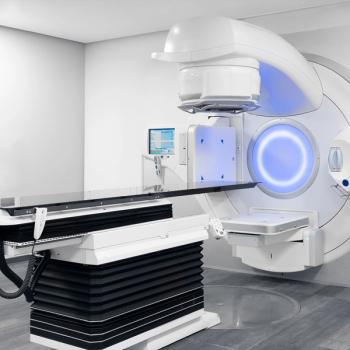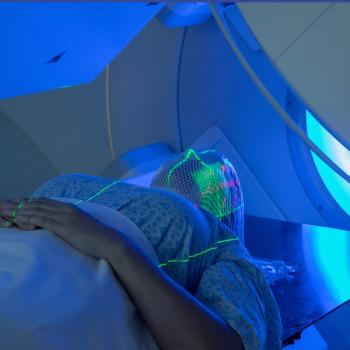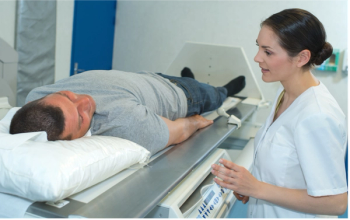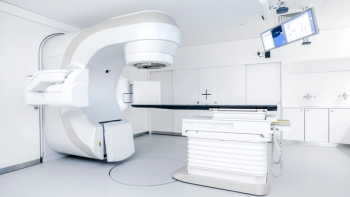
Dermatitis and lymphedema are among the most pertinent adverse effects of radiation to the breast, according to Alexa M. Lantz, MSPAS, PA-C.

Dermatitis and lymphedema are among the most pertinent adverse effects of radiation to the breast, according to Alexa M. Lantz, MSPAS, PA-C.

Biology-guided radiotherapy involves teamwork across multiple specialists, according to Samantha Bianzon, BSN, RN.

Nurses should be familiar with PET scan protocol and what to ask patients with lung and bone cancers before administering biology-guided radiation therapy.

Nurses play a crucial role for patients with prostate cancer undergoing radiation treatment, according to a radiation oncology nurse.

Hypofractionated radiotherapy was noninferior to conventional radiotherapy in patients with low-risk prostate cancer.

PSMA response was linked to improved metastasis-free survival in patients with oligometastatic castration-sensitive prostate cancer.

Amy Martinez, BSN, RN, OCN, explains how her team incorporated the Timed-Up-and-Go test into their workflows on a radiology unit.

Data from a single-institution study showed that 98.6% of their patients with head and neck cancer experienced oral mucositis.

Older patients with kidney cancer experienced “exceptional” disease control with stereotactic ablative radiotherapy—which is noninvasive and occurs in the outpatient setting.

Reduced-dose or partial-breast radiotherapy showed comparable safety and efficacy outcomes compared with whole-breast radiotherapy.

Cervical cancer survivors who regularly engage in sex or use vaginal dilators report lower levels of vaginal shortening.

Using diagnostic CT scans to create palliation plans may save time and improve the patient experience.

Patients with early breast cancer may safely choose a shorter course of radiation therapy following reconstruction.

The FDA has issued a complete response letter to the new drug application for avasopasem manganese to manage oral mucositis in patients with locally advanced head and neck cancer undergoing radiation.

Patients with nonmetastatic clinically node positive bladder cancer who wish to avoid major surgery may achieve similar clinical outcomes with trimodal therapy.

Among patients with lung oligometastases, no significant differences in overall or disease-free survival were observed with single- and multi-fraction stereotactic ablative body radiotherapy.

Omitting radiotherapy did not compromise overall survival rates for patients with primary mediastinal B-cell lymphoma.

Elizabeth R. Cullen, MSN, ARNP, provides an overview of avasopasem manganese and its potential role in reducing severe oral mucositis for patients undergoing radiotherapy.

Research published in JAMA Oncology suggest that acute radiation dermatitis may be the result of a common skin bacterium and prevented with a low-cost topical treatment.

Radioligand therapy with 177Lu-PSMA-I&T elicited favorable PSA responses and a safety profile similar to PSMA-617.

Elizabeth R. Cullen, MSN, ARNP, highlights the efficacy of avasopasem manganese in mitigating severe oral mucositis in patients with locally advanced head and neck cancer.

Hilda Haynes-Lewis, PhD, ANP-BC, AOCNP; and Rosaleen Bloom PhD, APRN, ACNS-BC, AOCNS, discuss the ways a cancer diagnosis can impair an individual’s ability to work normally.

Ashley Marenyi, RN, BSN, OCN, highlights the importance of counseling patients with head and neck cancer on the short-term and long-term adverse effects of radiation treatment.

Early coordination with multiple specialty teams can maximize outcomes and improve quality of life for patients with complex metastatic disease.

Karyn A. Goodman, MD, MS, provides perspective on the potential advantages of stereotactic body radiation therapy in locally advanced pancreatic cancer.

Reanne Booker, MN, NP, highlights factors that make a patient a good candidate for palliative radiation.

Findings from a phase 2/3 trial found better disease-free and overall survival outcomes with radiation plus docetaxel vs radiation alone in head and neck squamous cell carcinoma.

Reanne Booker, MN, NP, shares how nurses can increase patient understanding on the role of palliative care in oncology.

Ellen Miller, MSN, FNP-BC, a nurse practitioner who specializes in survivorship care, underscores what conversations surrounding fertility and pregnancy may look like after radiation.

The rate of severe radiation dermatitis was reduced with the use of Mepital Film in patients with breast cancer undergoing mastectomy.